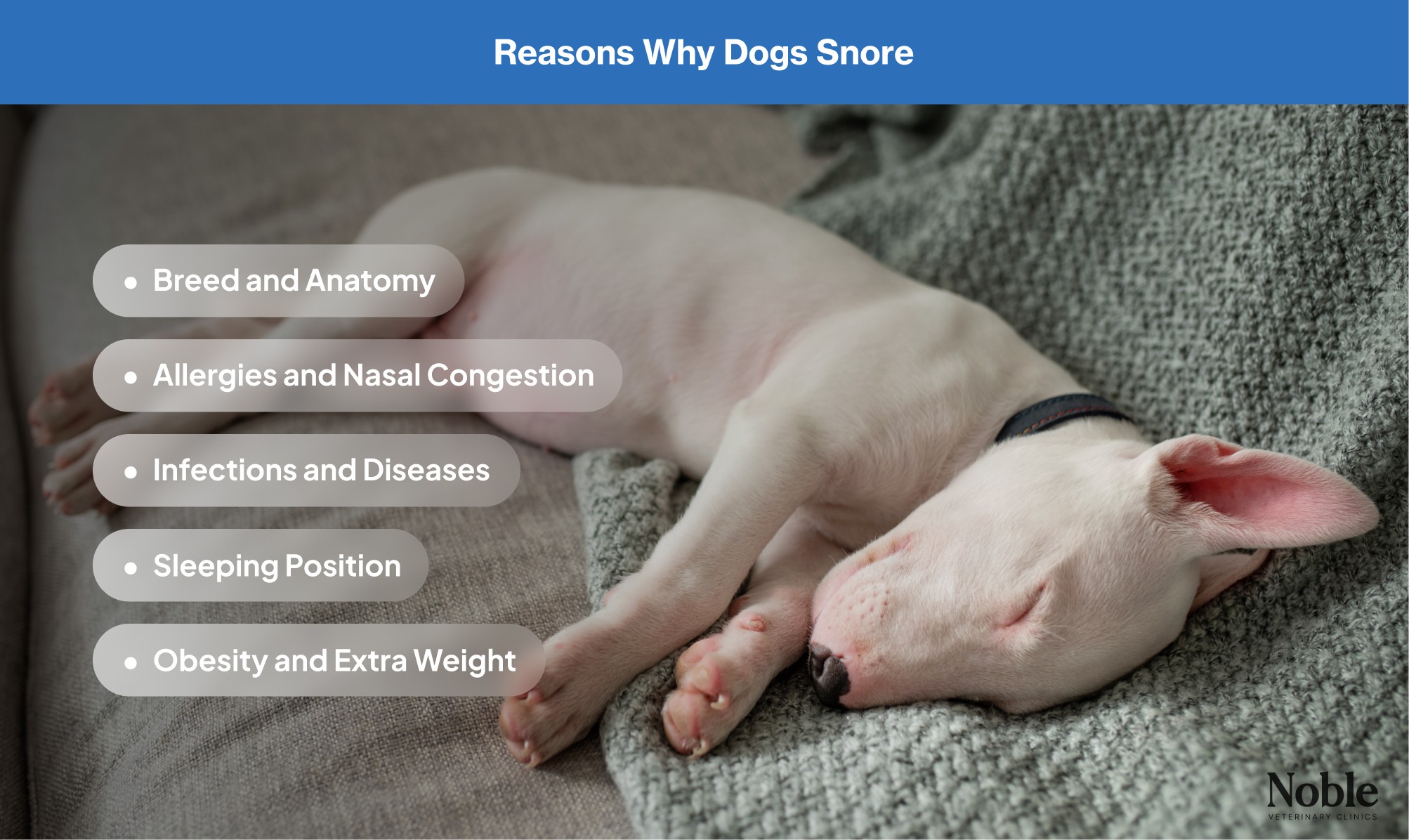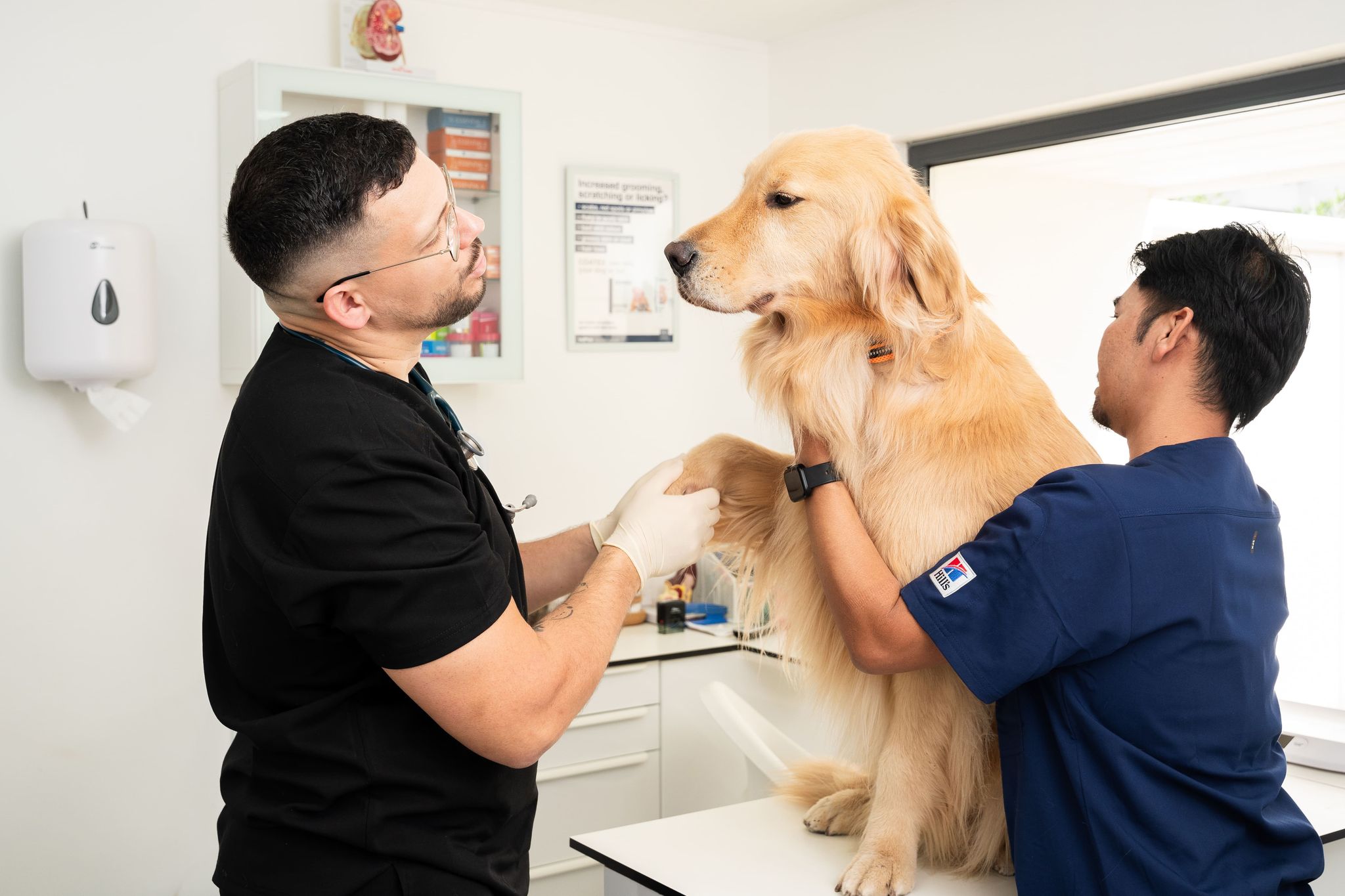


Have you ever dozed off with your dog, only to be suddenly woken up by their snoring? If yes, then don’t be alarmed. In many cases, dogs can snore. Sometimes it’s barely noticeable, while other times it’s enough to wake up the whole room. But is it something to really worry about?
In this blog, we'll share everything you need to know about why dogs snore, when it's normal, and what you can do to help.
Is Dog Snoring Normal?
It's normal for a dog to snore. Just like us, dogs can snore when their airways get slightly restricted. This means that the airflow will be less during their sleep. It’s often harmless and not a cause of concern.
Dog snoring that is light and consistent is normal. If it doesn't affect your dog's behavior, then it might be fine. However, any sudden snoring or increase in volume will be a concern. Add other symptoms such as coughing or wheezing to the mix, and it's a red flag that should be checked.
Why Do Dogs Snore So Loudly?

Your dog's snore can sound as soft as the night or as loud as a traffic jam in the afternoon. This sound is usually caused by something partially restricting airflow through the nose, throat, or mouth. Here are the common reasons why dogs snore so loudly:
Breed and Anatomy
Some dog breeds are inherently more prone to snoring. These dogs often have a short snout and a flat face. If your dog has these features, then it might be a brachycephalic breed. Here are the common ones:
The reason why these dogs can experience snoring more often than other dogs is due to their narrower airways. To add to that, their elongated soft palates and excess throat muscles can vibrate when breathing. This might be why your dog is snoring so loudly.
However, it's not just brachycephalic dogs who can snore occasionally. Other dogs can also do it because of their sleeping positions, energy levels, allergies, or the extra weight they have.
Allergies and Nasal Congestion
Dogs can also snore when they get stuffy noses from dust, pollen, smoke, and other irritants that might trigger their allergies. This happens when the nasal passages swell up and produce extra mucus, which further restricts airflow. As a result, affected dogs tend to snore loudly.
Loud snoring can also be caused by a foreign object physically obstructing the nose or throat of dogs. This can be anything from a simple blade of grass, a growth in the nasal passage, or swelling from allergic reactions.
Infections and Diseases
Infections can also contribute to your dog’s snoring, primarily due to the swelling they cause. Upper respiratory infections, dental abscesses, and fungal infections can all contribute to snoring. Kennel cough is a common culprit.
Sleeping Position
A dog’s sleeping position can also determine if they snore and how loud it is. When dogs sleep on their backs, it causes the tongue and the soft tissues of the throat to partially block the airway. This is often the reason why dogs snore loudly, especially when they’re deep asleep.
You might notice that the snoring will stop and quiet down when they change positions. Your dog’s sleep tells a lot.
Obesity and Extra Weight
Overweight dogs tend to carry more fat around their neck and chest. This can compress their airway and make it narrower when they lie down. This can result in louder, persistent snoring. Even the extra added weight can make a difference depending on your dog’s breed.
When Is Dog Snoring a Problem?

Now that we know why your dog’s snore is loud, let’s talk about when it becomes a problem. The most important thing to look at is the other factors that accompany your dog’s snoring. Here are the red flags you should take note of:
Snoring starts suddenly. If your dog starts to snore suddenly without any known history of doing so, then it’s worth paying attention to. This could point to a new health issue, such as an infection, allergic reaction, or growth along the nasal passageway.
Breathing seems labored. Snoring should only happen during sleep. If you notice your dog’s breathing to be labored, congested, or heavy, then something might be obstructing its airway. This can mean fluid buildup or something more serious, like tracheal collapse.
There are other symptoms. If your dog’s snoring comes with other symptoms such as nasal discharge, coughing, loss of appetite, lethargy, or even gagging, then it might be a respiratory infection.
Your dog has a health condition. For dogs with brachycephalic airway syndrome, obesity, or chronic allergies, they are already at risk of airway issues. Sudden or frequent snoring can often indicate the progression of these issues.
Breathing stops briefly during sleep. If your dog’s breathing changes during sleep, like turning on and off, then it might be a case of sleep apnea. It’s somewhat common in flat-faced breeds, so keep a close eye if your dog is at risk.
How to Stop Dog Snoring?
If your dog’s snoring is accompanied by other symptoms and factors, then it’s recommended to take action.
Addressing the main issue that might have something to do with your dog’s snoring is the way to stop it. This can include specific medications such as antihistamines, nasal sprays, anti-inflammatories, and antimicrobials.
For some cases, we might do more invasive procedures for issues such as BOAS, nasal tumors, abscess drainage, and foreign body retrieval. The main goal of each procedure is to remove the obstruction and promote proper airflow within your dog’s nasal passageway.
Dog Snoring Remedies You Can Do At Home

While not every dog who snores needs treatment, a few smart changes can help and make a big difference. Here are the best dog snoring remedies you can try out:
Change your dog’s sleeping position
Dogs can snore when sleeping on their backs. To stop dog snoring, you can provide a special dog bed with a raised edge. This encourages them to take a sleeping position that keeps their head elevated, opening up the airways.
There are plenty of options available in the market for dog beds that can help provide a much more comfortable sleeping position. This includes orthopedic and elevated beds made with breathable materials.
Clean your home
Keeping your home clean helps prevent allergic reactions that might be the reason why your dog is snoring. Place your dog in a different room while you're cleaning. This helps prevent exposure to allergens while you’re in the process of removing them.
Make sure to wash your dog’s bed, blankets, pillows, and bedding. Also, consider using an air purifier and humidifier to improve the air quality while also avoiding airborne allergens.
Oversee your dog’s weight
Keeping your dog at a healthy weight is one of the best ways to remedy dog snoring and improve overall health. When your dog's weight is appropriate to its age and breed, they can avoid a lot of health issues.
Start by ensuring your dog's diet is comprised of high-quality ingredients. This means no unnecessary additives and fillers, as they can only add to the weight. Next, oversee your dog's exercise routine.
We recommend 30 to 2 hours of exercise a day, depending on your dog's specific breed, lifestyle, and activity level. If you need any help with training your dog or maybe just figuring out the best routine, feel free to consult with our partner dog trainers.
Manage your dog’s health
If your dog is experiencing a health issue, be sure to manage it. Anything from a simple allergy to a more serious growth can cause snoring in dogs. Work with our vets so we can create the most suitable treatment and recovery plan for your best friend.
“Taking the right steps to keep your dog healthy is the best thing a pet owner can do.”
- Dr. Nenad Misura
Final Thoughts
Dogs do snore, and it’s completely normal in many cases. However, if your dog’s snoring is sudden, unusually loud, or paired with other symptoms such as coughing and wheezing, then it could be something more serious.
The good news is that there are plenty of ways to help. From simple home adjustments to more complex vet treatments, these steps aim to stop dog snoring and the underlying issue itself.
Share











